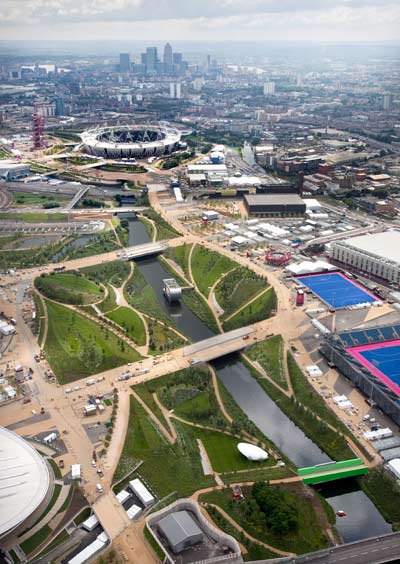London Olympics leaves East End legacy
Updated: 2012-08-14 20:40
By Cecily Liu (chinadaily.com.cn)
|
||||||||
|
 |
|
Robin Wales, Newham's Mayor /by Cecily Liu, China Daily |
“We are an area of poverty, and I want Stratford to be a place for people who work, a decent place for people to bring up their kids,” said Robin Wales, mayor of the London borough Newham.
Home to Stratford district where most of the Olympic Park is situated, Newham is one of six dedicated Olympic host boroughs in East London. The others are Greenwich, Hackney, Tower Hamlets, Barking & Dagenham and Waltham Forest.
According to Wales, his borough is the second most deprived in Britain and life expectancy is several years lower than in wealthier central London, hence “convergence” with the rest of London is the legacy he hopes to see.
In the last few years, Stratford’s appearance has been transformed by the building of the Olympic Park, which cost the British government nine billion pounds ($14.10 billion).
The opening of Westfield Stratford City, Europe's largest urban shopping mall, on the edge of the Olympic Park last September has also put thousands of locals back into employment.
The 17 billion pounds spent on improving London’s transport ahead of the Games also increased East London’s connectivity, especially with the newly added high-speed trains and cable cars.
But Wales says the difficult task now is to ensure Stratford’s newfound vibrancy continues beyond the Olympics. In particular, he hopes the Newham government’s achievement of having helped 5,000 locals find jobs last year can be repeated every year for a decade.
"If we keep it going for the next decade, then we will see a change for our people and the Olympics and all the investment will have been worthwhile," he said.
After the Games end, the Olympic Park will be developed into a new community that includes schools, nurseries, community spaces, health centers and 6,800 new homes, creating 8,000 permanent jobs in the process.
To be reopened as the Queen Elizabeth Olympic Park, the area sees a future as a centre for technology companies, a base for university campuses and a new tourism attraction.
The fate of the Olympic Stadium is still to be decided, with local Premier League football club West Ham among four bidders who want to move in after the Games.
But the Aquatic Centre will become a community swimming pool and the Velodrome a local cycling venue, both to be accessed by the public.
The blocks of flats where athletes are housed will provide 2,800 new rental homes from next year in a development named "East Village", and the Press and Broadcast Centre will be transformed into a new complex with 91,000 square meters of business space, available for businesses to rent.
Wales described the Games as the "opportunity of a lifetime", especially for local youth who are desperate for work. “What we are really proud to show in our area is our people,” he said enthusiastically.
“Not the parking lot”
Although most of the Olympic Park lies within Stratford, neighboring boroughs are vying for financial and social benefits from the Olympics.
“We’ve worked very hard to make sure Tower Hamlets is not used just as the parking lot for the Olympics”, said Rania Khan, a councilor of Tower Hamlets.
“Tower Hamlets is on the highway to the Olympic stadium, you can step into the Olympics from the borough,” she explained.
Tower Hamlets was originally appointed to host Olympic marathon, but the Olympic organizers decided to shift the route to central London in 2010 for logistic reasons.
At first, the furious local council took legal procedures against the Olympic organizers, but subsequently dropped its claim after being promised Olympic tickets for local school children and priority access to Olympic jobs for local jobseekers.
Looking back, Khan said that hosting the Olympic marathon probably “wouldn’t have made a significant difference” to the borough, as she believes other benefits such as having Brick Lane in Tower Hamlets being named Olympics Curry Capital would bring long term business benefits.
The council also successfully lobbied for funding from the central government to build about 4,000 new homes ahead of the Olympics for local residents, a project that would have taken much longer to complete if not for the Olympics.
|
 |
| Olympic Park/ by Olympic Delivery Authority, provided to China Daily |
Hackney, home to the Handball Arena and the Olympic Hockey Centre, has organized many themed conferences during the Olympics to showcase its best innovations to investors from all around the world.
With the second-highest rate of people claiming Jobseeker’s Allowance in London after neighboring Newham, Hackney is still quite poor despite an influx of investment from technology businesses like Google and Amazon in recent years.
“We want to use the Olympic Games as a catalyst to bring about changes, and attract investment from international businesses,” said Guy Nicholson, a Hackney councilor.
"New transport and new railways are brought into the community to help it thrive and prosper, and now we're to make sure that growth will benefit a wider community," Nicholson said.
These conferences focused on introducing Hackney’s technology, tourism, fashion, food and investment, amongst other themes.
Lessons from Beijing
When Beijing hosted the Olympics four years ago, Nicholson travelled with a team of experts from various London boroughs on a 10-day trip to learn how the Beijing government ran the Olympics.
The group learnt many lessons, including how to ensure transport runs smoothly, health services run smoothly, and that rubbish is collected on time.
"It's about how you adapt what you have," he said. So rather than employ more rubbish collectors, the same team of staff would have an altered shift to avoid the traffic.
Visiting Beijing in 2008 alongside Nicholson was Wales, who praised China’s Olympic Legacy.
“It seems to me that China wanted to show itself to the world and that was successful, so I think China got the legacy it wanted,” Wales said.
“One of the things about successful Olympic Games is that you are clear about what legacy you want, and China was clear,” he added.
Nevertheless, Wales feels that Beijing did not make the best use of its Olympic Park. “China planned its legacy very well but didn’t think through what it will use the actual park facility for,” he said.
But he now encourages Chinese businesses and investors to visit Stratford, and to help develop the area or open offices in the new commercial blocks available.
“We are keen to get Chinese investment. We have an area a third the size of Manhattan to develop. There are lots of opportunities, so come and develop it,” Wales urged.

 'Taken 2' grabs movie box office crown
'Taken 2' grabs movie box office crown
 Rihanna's 'Diamonds' tops UK pop chart
Rihanna's 'Diamonds' tops UK pop chart
 Fans get look at vintage Rolling Stones
Fans get look at vintage Rolling Stones
 Celebrities attend Power of Women event
Celebrities attend Power of Women event
 Ang Lee breaks 'every rule' to make unlikely new Life of Pi film
Ang Lee breaks 'every rule' to make unlikely new Life of Pi film
 Rihanna almost thrown out of nightclub
Rihanna almost thrown out of nightclub
 'Dark Knight' wins weekend box office
'Dark Knight' wins weekend box office
 'Total Recall' stars gather in Beverly Hills
'Total Recall' stars gather in Beverly Hills
Most Viewed
Editor's Picks

|

|

|

|

|

|
Today's Top News
Health new priority for quake zone
Xi meets US top military officer
Japan's boats driven out of Diaoyu
China mulls online shopping legislation
Bird flu death toll rises to 22
Putin appoints new ambassador to China
Japanese ships blocked from Diaoyu Islands
Inspired by Guan, more Chinese pick up golf
US Weekly

|

|






